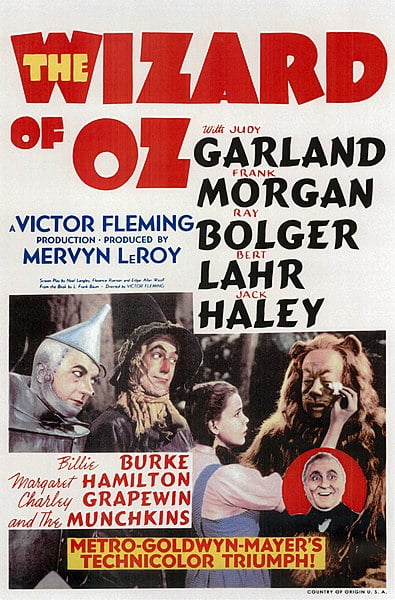Amazing Sights To See ! The Tornado . . . Munchkinland . . . Horse Of A Different Color . . . Startling Balloon Ascent . . . Flying Monkeys . . . Trees That Talk And Throw Apples

The Wizard of Oz is a 1939 American musical fantasy film produced by Metro-Goldwyn-Mayer, currently distributed by Warner Bros. Pictures. Widely considered to be one of the greatest films in cinema history, it is the best-known and most commercially successful adaptation of L. Frank Baum’s 1900 children’s book The Wonderful Wizard of Oz. Directed primarily by Victor Fleming (who left production to take over the troubled production of Gone with the Wind), the film stars Judy Garland as Dorothy Galealongside Ray Bolger, Jack Haley, Bert Lahr.
Characterized by its legendary use of Technicolor, fantasy storytelling, musical score, and memorable characters, the film has become an icon of American popular culture. It was nominated for six Academy Awards, including Best Picture, but lost to Gone with the Wind, also directed by Victor Fleming. It did win in two other categories: Best Original Song for “Over the Rainbow” and Best Original Score by Herbert Stothart. While the film was considered a critical success upon release in August 1939, it failed to make a profit for MGM until the 1949 re-release, earning only $3,017,000 on a $2,777,000 budget, not including promotional costs, which made it MGM’s most expensive production at that time.
The 1956 television broadcast premiere of the film on the CBS network reintroduced the film to the public; according to the Library of Congress, it is the most seen film in movie history. It was among the first 25 films that inaugurated the National Film Registry list in 1989. It is also one of the few films on UNESCO‘s Memory of the World Register. The film is among the top ten in the BFI list of the 50 films you should see by the age of 14.
The Wizard of Oz is the source of many quotes referenced in contemporary popular culture. Noel Langley, Florence Ryerson, and Edgar Allan Woolf received credit for the screenplay, but uncredited contributions were made by others. The songs were written by Edgar “Yip” Harburg (lyrics) and Harold Arlen (music). The musical score and the incidental music were composed by Stothart.

 Buy me a coffee
Buy me a coffee